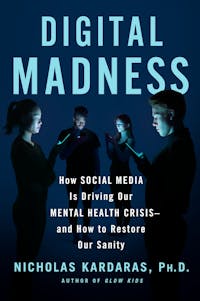Digital Madness
How Social Media Is Driving Our Mental Health Crisis--and How to Restore Our Sanity
 Download image
Download image
ISBN10: 125027849X
ISBN13: 9781250278494
Hardcover
288 Pages
$28.99
CA$38.99
Dr. Nicholas Kardaras is at the forefront of psychologists sounding the alarm about the impact of excessive technology on younger brains. In Glow Kids, he described what screen time does to children, calling it “digital heroin”. Now, in Digital Madness, Dr. Kardaras turns his attention to our teens and young adults and looks at the mental health impact of tech addiction and corrosive social media.
In Digital Madness, Dr. Kardaras answers the question of why young people’s mental health is deteriorating as we become a more technologically advanced society. While enthralled with shiny devices and immersed in Instagram, TikTok, Twitter, Facebook and Snapchat, our young people are struggling with record rates of depression, loneliness, anxiety, overdoses and suicide. What’s driving this mental health epidemic? Our immersion in toxic social media has created polarizing extremes of emotion and addictive dependency, while also acting as a toxic "digital social contagion”, spreading a variety of psychiatric disorders.
The algorithm-fueled polarity of social media also shapes the brain's architecture into inherently pathological and reactive "black and white" thinking—toxic for politics and society, but also symptomatic of several mental disorders. Digital Madness also examines how the profit-driven titans of Big Tech have created our unhealthy tech-dependent lifestyle: sedentary, screen-staring, addicted, depressed, isolated and empty—all in the pursuit of increased engagement, data mining and monetization.
But there is a solution. Dr. Kardaras offers a path out of our crisis, using examples from classical philosophy that encourage resilience, critical thinking and the pursuit of sanity-sustaining purpose in people’s lives. Digital Madness is a crucial book for parents, educators, therapists, public health professionals, and policymakers who are searching for ways to restore our young people’s mental and physical health.
Reviews
Praise for Digital Madness
“Mental health has become one of the biggest issues of our time and Dr. Kardaras highlights a perfect storm that may have irreversible damage to our health if we don’t act quickly. The growing risks and distractions prevalent in our society have never existed as they do now, and I can only thank Dr. Kardaras for his perceptive insight that will no doubt lead to real solutions to tackle the greatest mental-health crisis of our time. A must-read.”—Dr. Vanila M. Singh, M.D., Clinical Associate Professor, Stanford School of Medicine, and former Chief Medical Officer, U.S. Department of Health and Human Services
“Digital Madness is the book we need now! So many of us have participated willingly in the creation of a society addicted to digital devices and social media. Those willing to put down their devices long enough to read this book will not only learn how we can begin to unplug, they will also learn how we can begin to recover and regain our collective sanity.”—Pedro A. Noguera, Ph.D., Dean of the Rossier School of Education at the University of Southern California
“Kardaras guides readers through a whirlwind exploration of social media–induced societal sickness. In our downward spiral of cultural crisis, Digital Madness—like Glow Kids before it—should be required reading for anyone who has ever clicked the Like button.”—Jeff Greenberger, Ph.D., Stony Brook University, Professor of Classics, and Fulbright Scholar
“Kardaras expertly dismantles the world of big tech in Digital Madness, blending personal and professional experience to write an essential guide to the relationship between technology and mental health. The result is a book that’s moving, convincing, and—given Kardaras’s strength as a writer—a pleasure to read.”—Adam Alter, New York Times bestselling author of Irresistible and Drunk Tank Pink and NYU Stern School of Business Professor of Marketing and Psychology
“Digital Madness is as fascinating as it is alarming, reminding us that just because social media is now ubiquitous, it doesn’t have to go unchecked at the expense of mental well-being. Calling on individuals and society at large to acknowledge and address a myriad of implications, Dr. Kardaras is leading a movement to prioritize public health as we navigate uncharted waters.”—Former congressman Patrick J. Kennedy, founder of the Kennedy Forum
“Digital Madness highlights in the most eloquent way our unnoticed prisoner self in the dark cave of social media. Dr. Kardaras addresses the impact of technology on mental health and our attempts to socialize in an ever-polarized digital world. In the wake of COVID-19, this book reflects our deepest concerns about life online, but also points the way out of the mental-health crisis. An outstanding contribution to contemporary mental-health matters, this is a must-read.”—Zoe Rapti, Deputy Minister of Mental Health, Greece
"Something has gone seriously wrong with American society, and the root cause is digital technology . . . A frightening diagnosis of a corrosive plague by an articulate expert in the field."—Kirkus Reviews
“Psychologist Kardaras delivers a sobering account of how social media damages mental health . . . Kardaras uses easy to understand language to provide a bracing look at the toxic psychological effects of too much tech . . . Readers will be unnerved.”—Publishers Weekly



